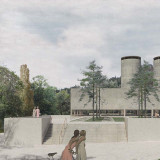Supervisor:
2025
(Re)covery is a means that helps different individuals free themselves from an illness that burdens them. In the field of healthcare, based on the structure of modern society, rehabilitation often causes discomfort and difficulties for individuals - either due to social exclusion or the creation of spaces that become unsuitable for participation in the healing process.
On the other hand, health concerns - both regarding people and the environment - trouble the citizens of the city of Volos due to the presence of an industry (AGET) that degrades their quality of life through uncontrolled gas emissions. At the same time, issues related to the privatization of healthcare in our country are beginning to raise concerns, creating the need for rehabilitation from this specific neoliberal profit-driven policy.
Thus, in this thesis, the concept of rehabilitation collaborates with architecture, taking on the role of restoring a place, a building, and a society.
The transformation of the cement industry into a space for rehabilitation and well-being constitutes not only an architectural intervention but also a deeper process of restoring the landscape and the relationship between humans and their surroundings. By connecting the sea with the mountains, the natural continuity of the environment is highlighted, while water, as a healing element, restores balance to a place that has been burdened for years. Through this approach, the space is transformed from a point of decay into a field of regeneration. Issues of purification, recycling, reuse, and memory work together to bring changes to healing spaces, as well as within social and scientific frameworks.
By bridging the gap between spaces of illness and the external environment - through aesthetics, sensory experience, and the human scale - fundamental principles are established for shaping a new architecture that promotes health.







